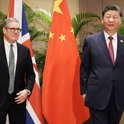Last October Jack Ma, founder of e-commerce giant Alibaba, gave a speech in Shanghai in which he criticised Beijing’s “outdated supervision” of private-sector business. What happened next is still reverberating around the world.
Ma disappeared from public life for three months. The planned $313bn listing of Alibaba’s financial offshoot, Ant Group, was cancelled. Since then, Chinese authorities have tightened competition rules for big tech companies, and told online education businesses that they cannot earn profits, list on any stock exchange or accept foreign investment (in an apparent bid to stop parents subjecting their children to excessive cramming to pass exams). Gaming companies, meanwhile, have bowed to pressure from state media and imposed severe limits on how long under-18s can play.
Few parents will shed tears over that last move, but recent events in China have serious implications. Risks for foreign investors—who have few cast-iron protections in China at the best of times—are now stratospheric. The crackdown on private business has, for the moment, made China uninvestable.
There has been much talk recently about the waning of US power. But China’s clampdown has hugely strengthened the pre-eminence of the US stock market. China is the only economy big enough to rival the US—and to produce companies of comparable scale to the biggest US corporations. If its biggest listed companies are being arbitrarily kneecapped by the Communist Party to stop them growing too powerful, they become impossible for foreign investors to own.
US financial markets therefore become unassailable in terms of size and liquidity. Even if big tech faces increasingly tough regulation there too, the US still wins simply by being the least bad option. Sadly, for investors, American equities are extremely expensive and vulnerable to a correction, so there are limits to the attractions here as well. The China situation also means investors should be extremely wary of emerging market funds. These have a heavy China weighting (typically a third) due to the sheer size of the country’s economy. If China is uninvestable, then so are these funds.
China has always been tricky for foreign investors—witness the humiliating end of the career of Anthony Bolton, a hero among the retail investment crowd who failed to replicate his UK success with a China fund. It now looks like an impossible market for outsiders, which leaves investors forced to hunt for opportunity in a far smaller world.












